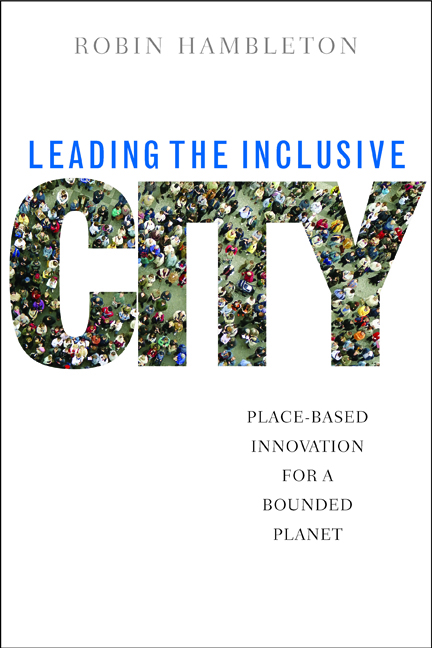Book contents
- Frontmatter
- Dedication
- Contents
- List of figures
- List of innovation stories
- About the author
- Preface
- A guide to the book
- Overview
- Part 1 Diagnosis: Understanding trends and challenges
- Part 2 Concepts: Place, leadership, innovation and democratic governance
- Part 3 Experiences: Place-based leadership in action
- Part 4 Lesson drawing: Insights and international learning
- Notes
- Appendix: International city networks and resources
- Acknowledgements
- References
- Index
Ten - The diversity advantage
Published online by Cambridge University Press: 08 March 2022
- Frontmatter
- Dedication
- Contents
- List of figures
- List of innovation stories
- About the author
- Preface
- A guide to the book
- Overview
- Part 1 Diagnosis: Understanding trends and challenges
- Part 2 Concepts: Place, leadership, innovation and democratic governance
- Part 3 Experiences: Place-based leadership in action
- Part 4 Lesson drawing: Insights and international learning
- Notes
- Appendix: International city networks and resources
- Acknowledgements
- References
- Index
Summary
One of the most important challenges facing modern societies, and at the same
time one of our most significant opportunities, is the increase in ethnic and
social heterogeneity in virtually all advanced countries
Robert Putnam, Diversity and Community in the 21st Century, 2007
Introduction
For centuries, if not throughout human history, cities have grown and changed as a result of migration and immigration. A consequence is that all cities are, to some extent, multicultural or multiethnic. In Chapter 2 I discussed the remarkable acceleration in the movement of peoples to cities in recent decades, and I also noted how the international movement of peoples has contributed to this trajectory of urban growth. In one sense this is nothing new – cities have always attracted migrants to them, including international migrants. As Peter Hall notes, in his review of creative cities in history, cultural diversity has been a key asset in the emergence and development of dynamic cities. His major study unearths insights from numerous innovative cities – from classical Athens, through industrial Manchester, and the dream factory of Los Angeles to social democratic Stockholm. His analysis suggests that: ‘Creative cities were nearly all cosmopolitan; they drew talent from the four corners of their worlds, and from the very start those worlds were often surprisingly far-flung’ (Hall 1998, 285).
Chapter 2 outlines how the interplay between globalisation and urbanisation has resulted in increasingly diverse cities. Some receiving cities, or immigrant gateway cities, now exhibit what Jill Gross and I have described as dynamic diversity. By this we mean the rapid arrival of large numbers of immigrants from a range of countries into a given city (Hambleton and Gross 2007, 218–20). Dynamic diversity does not refer simply to the swift pace of change and the numbers of immigrants, but also to the diversity in the origins of new arrivals. We used the phrase to suggest that nuances at the local level are likely to be more complex than hitherto. Immigrants bring with them their own unique cultural heritage that shapes their expectations and actions, and it is fair to say that remarkable population shifts are now taking place in some cities.
- Type
- Chapter
- Information
- Leading the Inclusive CityPlace-Based Innovation for a Bounded Planet, pp. 257 - 280Publisher: Bristol University PressPrint publication year: 2014



